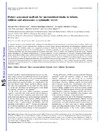Please use this identifier to cite or link to this item:
https://accedacris.ulpgc.es/jspui/handle/10553/44742
| Title: | Dietary assessment methods for micronutrient intake in infants, children and adolescents: a systematic review | Authors: | Ortiz-Andrellucchi, Adriana Henríquez Sánchez, Patricia Sánchez-Villegas, Almudena Peña Quintana, Luis Mendez, Michelle Serra-Majem, Lluís |
UNESCO Clasification: | 3206 Ciencias de la nutrición | Keywords: | Infants Children Adolescents Dietary Assessment Methods Systematic Review, et al |
Issue Date: | 2009 | Journal: | British Journal of Nutrition | Abstract: | A systematic literature search identified studies validating the methodology used for measuring the usual dietary intake in infants, children and adolescents. The quality of each validation study selected was assessed using a European micronutrient Recommendations Aligned-developed scoring system. The validation studies were categorised according to whether the study used a reference method that reflected short-term intake ( < 7 d), long-term intake ( > or = 7 d) or used biomarkers. A correlation coefficient for each nutrient was calculated from the mean of the correlation coefficients from each study weighted by the quality of the study. Thirty-two articles were included in the present review: validation studies from infants (1-23 months); child preschool (2-5 years); children (6-12 years); adolescents (13-18 years). Validation of FFQ studies in infants and preschool children using a reference method that reflected short-term intake showed good correlations for niacin, thiamin, vitamins B6, D, C, E, riboflavin, Ca, K, Mg, Fe and Zn (with correlations ranging from 0.55 for vitamin E to 0.69 for niacin).Regarding the reference method reflecting short-term intake in children and adolescents, good correlations were seen only for vitamin C (r 0.61) and Ca (r 0.51). Using serum levels of micronutrient demonstrated that the 3 d weighed dietary records was superior to the FFQ as a tool to validate micronutrient intakes. Including supplement users generally improved the correlations between micronutrient intakes estimated by any of the dietary intake methods and respective biochemical indices. | URI: | https://accedacris.ulpgc.es/handle/10553/44742 | ISSN: | 0007-1145 | DOI: | 10.1017/S0007114509993163 | Source: | British Journal of Nutrition [ISSN 0007-1145], v. 102 (sup. 1), p. S87-S117, (Diciembre 2009) |
| Appears in Collections: | Artículos |
SCOPUSTM
Citations
69
checked on Jun 8, 2025
WEB OF SCIENCETM
Citations
70
checked on Jan 25, 2026
Page view(s)
235
checked on Jan 15, 2026
Download(s)
222
checked on Jan 15, 2026
Google ScholarTM
Check
Altmetric
Share
Export metadata
Items in accedaCRIS are protected by copyright, with all rights reserved, unless otherwise indicated.
